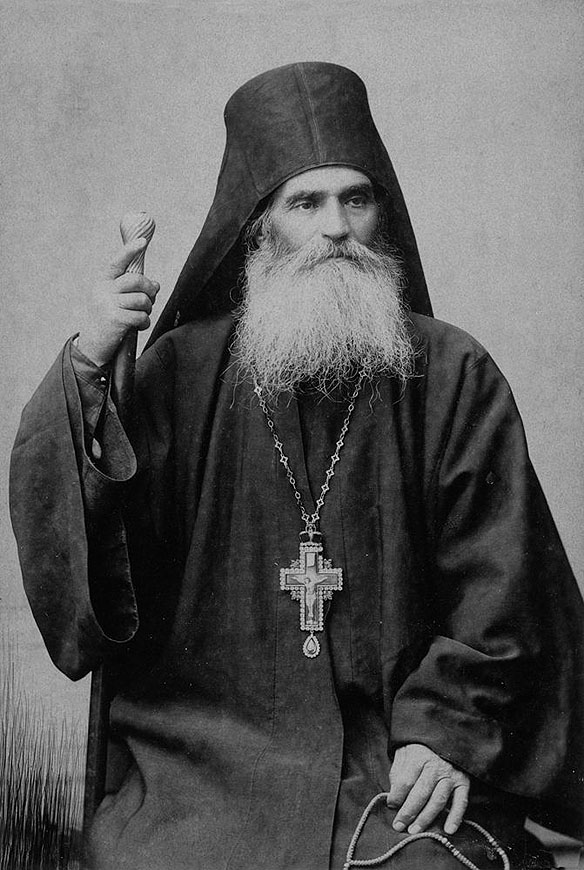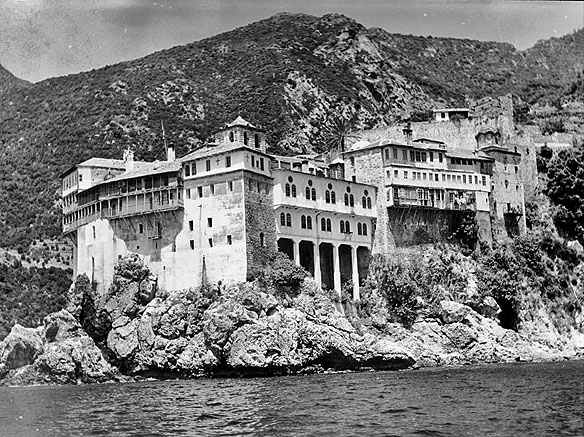
«Στις εφηβικές μου αναμνήσεις συνυπάρχουν τα πάρτι, η ρόκ μουσική και η γιαγιά μου. Για εκείνην, η ρόκ μουσική δεν ήταν παρά ένας κακότεχνος θόρυβος. Πάντως σεβόταν περισσότερο την νεανική μας σύγχυση, από όσο εμείς την νηφάλια σοφία της. Ήξερε που πηγαίναμε, αλλά ποτέ δεν έμπαινε στον πειρασμό να αντιπαρατεθεί προς ό,τι θεωρούσε φυσικό για την ηλικία μας. Σηκωνόταν, μας φιλούσε, ευχόταν να περάσουμε καλά, κι ύστερα προσέθετε να έχουμε τον Χριστό στην καρδιά μας εκεί που θα είμαστε, και ας κάνουμε ό,τι θέλουμε. Μετά μας σταύρωνε, ευχόταν να είναι η Παναγιά μαζί μας, και συμπλήρωνε διστακτικά, σαν να μην ήταν σίγουρη αν έπρεπε ἠ όχι να το ξεστομίσει, να μην αργήσουμε, γιατί θα προσευχόταν για μας όσο λείπαμε και δεν άντεχε να ξενυχτάει…
Τελειόφοιτος της Ιατρικής, αφελώς πεπεισμένος για την παντοδυναμία της επιστήμης, βρέθηκα στην Μονή Τιμίου Προδρόμου στο Έσσεξ. Έμεινα μόνο λίγες μέρες στο μοναστήρι αλλά η ανακάλυψη υπήρξε συγκλονιστική. Οι μοναχοί ζούσαν με τον τρόπο της γιαγιάς μου. Αναγνωριστικά σημάδια: το κομποσχοίνι, το ανεπιτήδευτο χαμόγελο και η άνευ όρων αποδοχή του άλλου.
Επιστρέφοντας στην Ελλάδα πήγα να δω τη γιαγιά. Μισοαστεία-μισοσοβαρά της είπα κάποια στιγμή: «Τόσα κομποσχοίνια έχεις, δεν θα μου δώσεις κι εμένα ένα;» Σοβάρεψε απότομα. Σχεδόν βούρκωσε. Πήγε και μου έφερε ένα κομποσχοίνι μεταξωτό και είπε:
«Πόρτο. Είναι το δικό σου. Στο φυλάω τρία χρόνια και περίμενα πότε θα μου το ζητήσεις». Η γιαγιά μου περίμενε να γυρίσω· από τα πάρτι, από τήν Αγγλία, από τον λανθασμένο δρόμο. Εγώ, και όσοι άλλοι συμπεριλαμβάνονταν στην προσευχή της…
Λίγους μήνες, πριν την αναχώρηση από τα επίγεια, με είχε πάρει ιδιαιτέρως και με αιφνιδίασε πάλι. Σε ένα χαρτοκιβώτιο είχε μαζέψει μια σειρά με όλα τα λειτουργικά βιβλία. Με την ίδια απλότητα, που μου έδωσε το «δικό μου» κομποσχοίνι, μου άφησε ρητή εντολή: «Αν κάποιος από σας γίνει ιερέας, θα τα κρατήσει αυτός. Αν όχι, θα βρεις κάποιο φτωχό ναό και θα τα δώσεις εκεί»…
Στην κηδεία της πολλοί άγνωστοι εμφανίστηκαν και μιλούσαν γι’ αυτήν με ευγνωμοσύνη. Όπως εκείνη η ηλικιωμένη κυρία, που έλεγε ότι η γιαγιά συνέχισε να την δέχεται στο σπίτι της, όταν όλοι την απέφευγαν. Και αυτό, γιατί απόκτησε ένα εξώγαμο παιδί λίγο μετά τον πόλεμο και την θεωρούσαν πόρνη. Διηγιόταν, ανάμεσα στα κλάματα, πως της έχωνε τσάντες με τρόφιμα κάτω από το παλτό, παρακαλώντας την να μην το μάθει κανείς…».
Η γιαγιά μου και πολλοί άλλοι ευλογημένοι παππούδες και γιαγιάδες αναπαύονται πια εν ειρήνη. Η ευθύνη για το σήμερα και το αύριο έχει περάσει στα χέρια μας. Καλούμαστε να καθρεφτίσουμε τον εαυτό μας στην παρακαταθήκη που μας άφησαν και να προβληματιστούμε σοβαρά για τον τρόπο, που θα διαχειριστούμε την πνευματική μας κληρονομιά.
(Πρωτ. Αδαμάντιου Αυγουστίδη, Αναπλ. Καθηγητή Θεολογικής Σχολής Παν/μίου Αθηνών.
«Παραμυθητική Θεολογία», εκδ. Δομή.) /4synodoiporoi
http://orthodoxigynaika.blogspot.gr/2013/10/blog-post_6410.html


